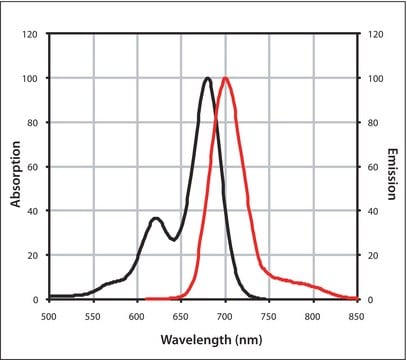SAB4600361
Anti-Mouse IgG (H+L), F(ab′)2 fragment, CF™680 antibody produced in goat
~2 mg/mL, affinity isolated antibody, buffered aqueous solution
About This Item
Recommended Products
biological source
goat
Quality Level
conjugate
CF™ 680 conjugate
antibody form
affinity isolated antibody
antibody product type
secondary antibodies
clone
polyclonal
form
buffered aqueous solution
species reactivity
mouse
concentration
~2 mg/mL
technique(s)
flow cytometry: 1-10 μg/mL
immunocytochemistry: suitable
immunohistochemistry: suitable
indirect ELISA: suitable
indirect immunofluorescence: 1-10 μg/mL
western blot: suitable
Related Categories
1 of 4
This Item | SAB4600394 | SAB4600401 | SAB4600397 |
|---|---|---|---|
| technique(s) flow cytometry: 1-10 μg/mL, immunohistochemistry: suitable, indirect immunofluorescence: 1-10 μg/mL, immunocytochemistry: suitable, western blot: suitable, indirect ELISA: suitable | technique(s) flow cytometry: 1-10 μg/mL, immunocytochemistry: suitable, immunohistochemistry: suitable, indirect ELISA: suitable, indirect immunofluorescence: 1-10 μg/mL, western blot: suitable | technique(s) flow cytometry: 1-10 μg/mL, immunocytochemistry: suitable, immunohistochemistry: suitable, indirect ELISA: suitable, indirect immunofluorescence: 1-10 μg/mL, western blot: suitable | technique(s) flow cytometry: 1-10 μg/mL, immunocytochemistry: suitable, immunohistochemistry: suitable, indirect ELISA: suitable, indirect immunofluorescence: 1-10 μg/mL, western blot: suitable |
| species reactivity mouse | species reactivity mouse | species reactivity mouse | species reactivity mouse |
| biological source goat | biological source goat | biological source goat | biological source goat |
| antibody form affinity isolated antibody | antibody form affinity isolated antibody | antibody form affinity isolated antibody | antibody form affinity isolated antibody |
| storage temp. −20°C | storage temp. −20°C | storage temp. −20°C | storage temp. −20°C |
General description
Specificity
Immunogen
Features and Benefits
Physical form
Preparation Note
Legal Information
Disclaimer
Not finding the right product?
Try our Product Selector Tool.
Storage Class Code
10 - Combustible liquids
WGK
WGK 2
Flash Point(F)
Not applicable
Flash Point(C)
Not applicable
Certificates of Analysis (COA)
Search for Certificates of Analysis (COA) by entering the products Lot/Batch Number. Lot and Batch Numbers can be found on a product’s label following the words ‘Lot’ or ‘Batch’.
Already Own This Product?
Find documentation for the products that you have recently purchased in the Document Library.
Our team of scientists has experience in all areas of research including Life Science, Material Science, Chemical Synthesis, Chromatography, Analytical and many others.
Contact Technical Service









